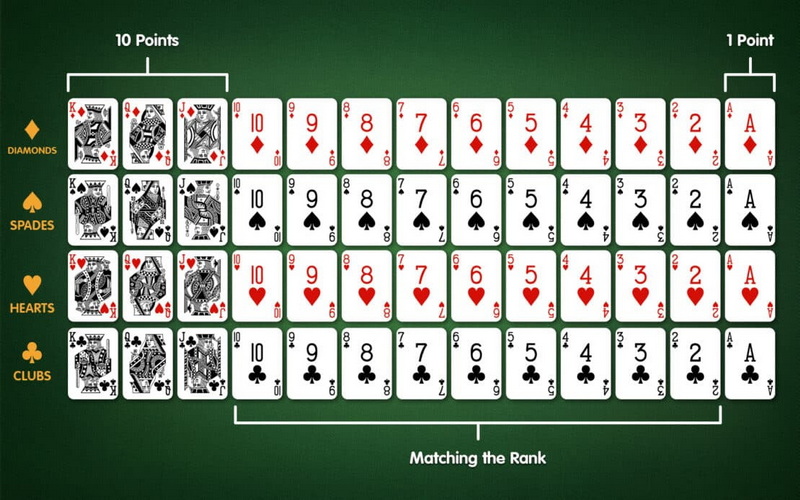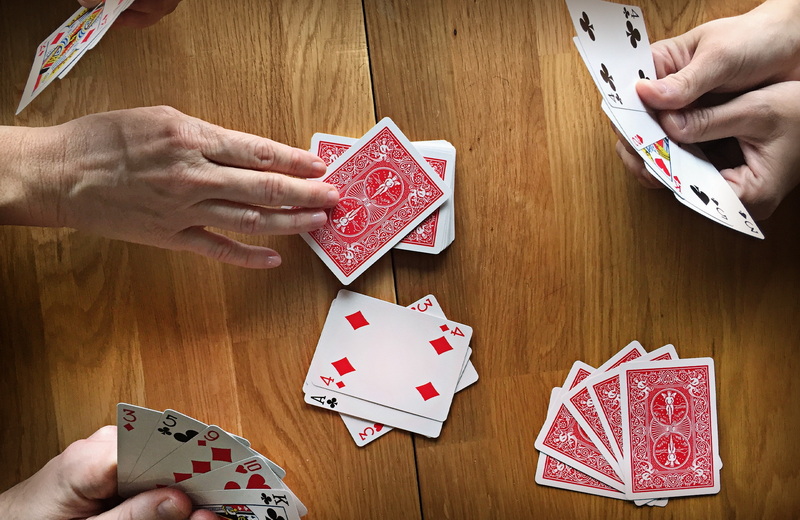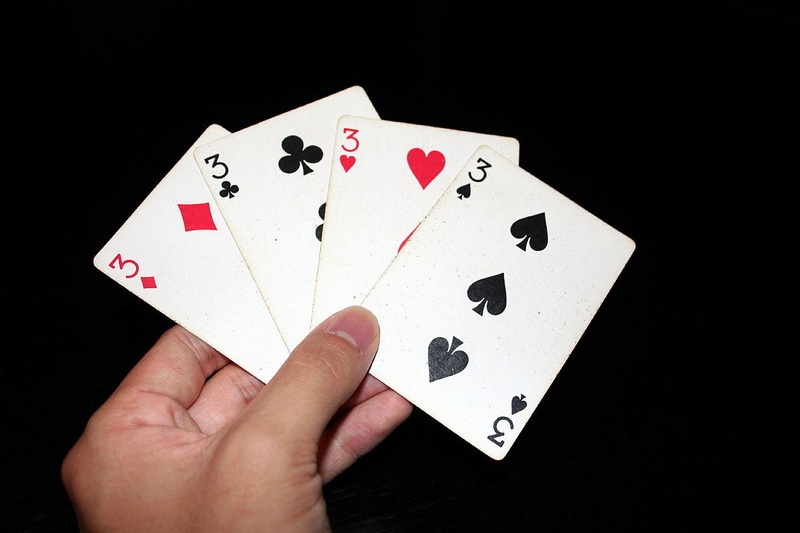Content Menu
● Overview of the Game
● Setting Up the Game
● Basic Rules
● Scoring in Gin Rummy
● Strategies for Winning
● Advanced Strategies
● Variations of Gin Rummy
● Common Mistakes to Avoid
● Conclusion
● Related Questions
>> 1. What are the basic rules for playing Gin Rummy?
>> 2. How do you score points in Gin Rummy?
>> 3. What does it mean to "knock" in Gin Rummy?
>> 4. Can you explain what "going gin" means?
>> 5. What strategies can improve my chances in Gin Rummy?
● Citations:
Gin Rummy is a classic two-player card game that combines skill, strategy, and a bit of luck. The objective is to form valid combinations of cards—known as melds—while minimizing the point value of unmatched cards in your hand. In this comprehensive guide, we will explore the rules, strategies, and nuances of Gin Rummy to help you become a proficient player.

Overview of the Game
Gin Rummy is played with a standard 52-card deck, excluding jokers. The game is typically played by two players who aim to score points by forming sets and runs. A set consists of three or four cards of the same rank (e.g., three 7s), while a run is a sequence of three or more cards of the same suit (e.g., 4, 5, 6 of hearts).
The game is played over several rounds, and the first player to reach a predetermined score—usually 100 points—wins.
Setting Up the Game
To start a game of Gin Rummy:
- Deal Cards: Each player is dealt ten cards face down. The remaining cards form the stockpile, placed face down, while the top card is turned face up to start the discard pile.
- Determine Dealer: The player with the lowest card drawn from the deck becomes the dealer.
- Gameplay Order: The non-dealer goes first in each round.
Basic Rules
The gameplay consists of drawing and discarding cards in turns:
- Drawing Cards: On their turn, a player can draw either the top card from the discard pile or one from the stockpile.
- Discarding Cards: After drawing, the player must discard one card face up onto the discard pile.
- Knocking: A player can "knock" when their unmatched cards (deadwood) total ten points or less. This signals the end of that round.
- Going Gin: If a player manages to meld all ten cards without any unmatched cards, they declare "Gin," which scores additional points.
Scoring in Gin Rummy
Scoring is an essential aspect of Gin Rummy:
- Point Values:
- Aces are worth 1 point.
- Face cards (Kings, Queens, Jacks) are worth 10 points.
- Number cards are worth their face value.
- Calculating Deadwood: At the end of a round, players reveal their hands and calculate their deadwood points (the total value of unmatched cards).
- Points for Knocking:
- If the knocking player has lower deadwood than their opponent, they score the difference.
- If the opponent has equal or lower deadwood, they have undercut the knocker and score additional points.
- Gin Bonus: A player who declares Gin scores an additional bonus (typically 25 points) plus their opponent's deadwood total.

Strategies for Winning
To improve your chances of winning at Gin Rummy, consider these strategies:
- Organize Your Hand: Keep your cards sorted by rank and suit to easily identify potential melds.
- Form Sequences Early: Aim to create runs as they allow for more flexibility in adding cards compared to sets. This increases your chances of forming additional melds throughout the game.
- Draw Wisely: Only draw from the discard pile if it helps you form a meld; otherwise, draw from the stockpile to keep your options open. Drawing from the discard pile can also reveal your intentions to your opponent.
- Knock Early if Possible: If you have low deadwood and can knock successfully, consider doing so before your opponent can improve their hand. Early knocking can catch your opponent off guard and may lead to scoring opportunities.
- Watch Your Opponent's Discards: Pay attention to what your opponent discards; it can give you insights into their hand and help you avoid giving them useful cards. This information can be crucial in deciding which cards to keep or discard yourself.
- Hold onto Middle Cards: Cards like 5s, 6s, and 7s are versatile since they can complete multiple runs or sets. Keeping these middle-value cards increases your chances of forming melds later in the game.
Advanced Strategies
As you become more comfortable with Gin Rummy, consider incorporating these advanced strategies into your gameplay:
- Psychological Play: Use psychological tactics by discarding cards that may mislead your opponent about your hand. For instance, if you're looking for an 8 of hearts but have an 8 of spades in hand, discarding an 8 of diamonds might trick them into thinking you're not collecting eights.
- Adapt Your Strategy: Be flexible with your strategy based on how your opponent plays. If they tend to hold onto high-value cards, adjust your discards accordingly to avoid giving them helpful options.
- Defensive Play: Sometimes it's better to play defensively rather than aggressively building your own hand. Focus on discarding cards that you believe your opponent needs while keeping track of what they have picked up from both piles.
Variations of Gin Rummy
There are several popular variations of Gin Rummy that introduce different rules or scoring systems:
- Hollywood Gin: This variation tracks scores across multiple games instead of just one round. Players accumulate points over several rounds until one reaches a predetermined score.
- Skarney Gin: Players must form specific melds before laying off cards onto existing melds. This adds an extra layer of strategy as players need to focus on specific combinations rather than general melding.
- Oklahoma Gin: In this version, players may only knock if their unmatched card value equals or is less than that of the upcard turned at the start of play. This variation introduces additional strategic considerations regarding when to knock based on available upcards.
Common Mistakes to Avoid
When playing Gin Rummy, be mindful of these common pitfalls:
- Holding High Cards Too Long: Avoid keeping high-value unmatched cards as they can significantly increase your deadwood score if your opponent knocks or goes gin.
- Ignoring Opponent's Moves: Failing to pay attention to what your opponent draws or discards can lead you to make poor decisions in your own play. Staying aware will help you make informed choices about which cards to keep or discard.
- Discarding Useful Cards Too Soon: Be cautious about discarding cards that could potentially help your opponent complete their melds. Holding onto certain cards for longer may allow you to better gauge what they are trying to collect.
Conclusion
Gin Rummy is not only a fun card game but also one that requires strategic thinking and careful planning. By understanding its rules, mastering scoring techniques, and employing effective strategies, players can enhance their skills and enjoy this timeless classic even more. Whether playing casually with friends or competitively online, mastering Gin Rummy will provide hours of entertainment and challenge.

Related Questions
1. What are the basic rules for playing Gin Rummy?
The basic rules include dealing ten cards to each player, drawing from either the stockpile or discard pile on turns, discarding one card after drawing, and aiming to form sets or runs while minimizing unmatched card values.
2. How do you score points in Gin Rummy?
Points are scored based on unmatched card values at the end of each round. Aces are worth 1 point; face cards are worth 10 points; other cards are worth their face value. Bonuses are awarded for knocking and going gin.
3. What does it mean to "knock" in Gin Rummy?
Knocking means that a player believes they have minimized their unmatched card values to ten points or less. This signals the end of that round and allows for scoring based on deadwood values.
4. Can you explain what "going gin" means?
Going gin occurs when a player successfully forms melds with all ten cards in their hand without any unmatched cards remaining. This results in additional bonus points at the end of that round.
5. What strategies can improve my chances in Gin Rummy?
Effective strategies include organizing your hand for better visibility of potential melds, forming sequences early on, drawing wisely from piles based on your needs, knocking early if possible, and closely observing your opponent's moves.
Citations:
[1] https://www.mplgames.com/gin-rummy/gin-rummy-strategy
[2] https://www.thesprucecrafts.com/gin-rummy-card-game-strategy-and-tips-412364
[3] https://en.wikipedia.org/wiki/Gin_rummy
[4] https://www.rubl.com/rules/gin-rummy-tutorial.html
[5] https://www.linkedin.com/pulse/10-tips-help-you-win-gin-rummy-zarzilla
[6] https://bicyclecards.com/how-to-play/gin-rummy
[7] https://www.ginrummy-palace.com/gin-rummy-strategies/
[8] https://www.dummies.com/article/home-auto-hobbies/games/card-games/general-card-games/how-to-play-gin-rummy-193767/
[9] https://www.mplgames.com/gin-rummy/gin-rummy-variations
[10] https://playingcarddecks.com/blogs/how-to-play/gin-rummy-game-rules































